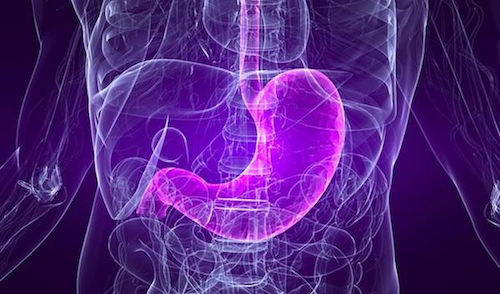I know, I know… digestion is such a fun topic. It’s not glamorous or pretty, but it is important. It’s the foundation of so many other inner workings of our body that it’s worth mastering.
It eas a “drip down” effect, so by addressing your digestion, you address so much more and create so much room for improvement in your health.
It’s also a very telling marker of health that you can fairly simply gauge on your own terms. If digestion feels off, it’s something we notice, and generally speaking, it’s something we can pin to a cause (i.e. what we’ve eaten recently).
So, what’s stomach acid got to do with it?

A lot, actually. Many people are on stomach acid blockers or taking antacids regularly in order to improve digestion. Unfortunately, this is a quick fix with no long-term benefits when it comes to actually addressing the problem.
It’s like a band-aid, and we never have to confront our inability to digest food or commit to a permanent, sustainable and healthy solution.
We know that for optimal digestion, we need to have a certain level of acidity in our stomach – you know, the pH level. The enzyme pepsin, for example, which is naturally present during digestion won’t be broken down unless acidity is around a pH of 2.
This is essentially what leads to undigested food which presents itself to us as belching, gas, bloating, diarrhea or even autoimmune disease!
Issues to address

It’s good to know whether or not paying mind to the issue of stomach acid is for you. If you experience any amount of digestive distress, the answer – in short – is YES.
Did you know that 44% of the American population suffers from heartburn at least once per month?
Digestive distress includes but is not limited to heartburn, indigestion, GERD and reflux, all of which are increasingly common and relatively easy to treat. Unfortunately, this treatment is subpar as I mentioned above.
Acid blockers are the number one selling drug. They’re the best-selling drug of all time, totalling around $7 billion in sales per year, so it’s no wonder big pharma is eager to push them on whoever might need ’em without much more explanation.
There’s something they’re not telling us though, and that’s how to mend our guts for life. We don’t always hear from our doctors that they’d like to keep us on ‘x medication’ indefinitely, but it’s often what they’re thinking.
If you’re here reading this, you’ve probably looked into a sustainable way to manage a healthy lifestyle in the most natural way possible.
Fortunately, digestion for many – even those with chronic diagnoses like GERD – can find relief with a little effort and some very inexpensive items, foods and supplements on their own. The first step? Stop suppressing stomach acid!
Low stomach acid a.k.a. hypochlorydia presents us with many problems, especially when it persists.
Why stomach acid is beneficial to us

- Nutrient absorption. Digestion needs to be working from top to bottom – and optimally – in order for our bodies to register all of the nutrition we’re chewing up and swallowing. When stomach acid is low, we run a higher risk of nutrient deficiency because low stomach acid causes all of the good stuff we’re eating to pass right through us due to an imbalanced pH. This is especially true with calcium, but applies to many vitamins and minerals.
- Production of digestive juices and enzymes. Blocking and neutralising stomach acid interrupts digestion. It impacts production of ALL important juices including pepsinogen, pepsin, secretin, CCK, pancreatic enzymes and bile. Without getting into the nitty-gritty, these fluids are vital for proper breakdown of our food and nutrient absorption.
- Ensures protein digestion. We eat protein for a good reason. It helps us maintain and build muscle plus keep our bones strong, and it keeps us full! Plus, depending on the source, we add in a myriad of other health benefits. When stomach acid is adequate, we don’t have to pull from our joint surfaces to supply protein where it’s needed because it isn’t being digested. In this case, stomach acid can prevent arthritis.
The risks of low stomach acid

These ever popular stomach acid blockers are decreasing our stomach acid, when in fact, too much stomach acid is a relatively rare problem. Why are we ceasing production then?
It’s pretty damaging overall. We’re not addressing too much stomach acid, but we are addressing what is referred to as acid indigestion.
The issue is looked at as something that’s black and white when it isn’t, and acid indigestion simply suggests some sort of reflux reaction to food.
Antacids can make us prone to bacterial infection due to cultivating a pH environment where bacteria can thrive, steal nutrients, vitamins and water from our bodies, give us bad breath or “bowel breath” (from all the germs now residing in the stomach – yuck!), and increase the risk of cancer because of bacterial overgrowth.
Overall, stomach acid suppression is dangerous and irresponsible, especially over a prolonged period of time.
Chronic low acid can actually cause asthma, and can possibly cause food allergies too, although this is a chicken-and-egg thing. Low stomach acid is often found in people who experience depression, too, which suggests a link.
Finally, low acid is a contributing factor to protein maldigestion in particular, and general inflammation in the stomach.
Some diseases linked to low stomach acid:
- Celiac’s disease
- Multiple sclerosis
- Rheumatoid arthritis
- Childhood asthma
- Type 1 diabetes
- Graves’ disease
- Lupus
As you can see, low stomach acid has a high correlation with autoimmune disease, and we KNOW that addressing gut health can be wildly effective in putting those diseases into remission, or reducing symptoms and flare-ups.
Functional testing for low stomach acid at home

Fortunately, you can easily avoid doctor’s offices and expensive testing in favor of doing it yourself at home with some very inexpensive tools and supplements.
This test will let you know if you have low or high stomach acid.
How to do the HCl test:
- Start with a supplement called Betaine HCl with pepsin (like these)
- Eat a high protein meal – a dish with 4-6 oz. of meat
- In the middle of the meal, take 1 Betaine HCl pill
- Continue taking HCl throughout meal (up to six), until you feel a slight warmth or burn in the belly
- Finish your meal as normal and pay attention to your body – even if nothing is happening
The goal is to feel a fire in the belly, a bit like you might if you took a shot of alcohol on its own. It will feel slightly warm for just a moment. This is a good sign!
If you feel the burn, you probably produce enough stomach acid. If you don’t feel anything, you’re much more at risk for having low stomach acid.
Therapeutic supplements and foods for digestion

These supplements can be fantastic to remedy digestive issues, restore nutrient and mineral balance if deficient, and are generally safe to use long-term. They can also be indicative of the root of the problem you want to address, i.e. too little stomach acid.
- Digestive enzymes. While digestive enzymes have a similar band-aid effect to antacids, they’re a safer bet to use on a regular basis. If symptoms of heartburn or indigestion persist, taking digestive enzymes like pancreatin, bromelain or papain with meals can reduce pain and improve digestion by creating an alkaline environment. Some physicians will approve of continued use of digestive enzymes, and the side effects (if any) are minimal. I like this brand, as the label is very clear about which enzymes work on different foods during digestion!
- Apple cider vinegar or lemon juice. One of the major habits we stress during our 9-week Happy Body Formula program is having lemon water first thing in the morning. Above all, we can contribute its impact to better digestion. Our bodies are at rest all night, and we need to boost digestion where it begins up north. Taking in some acidic agent first thing in the morning prior to eating – preferably not too diluted, so in around 8 oz. of water – can help get stomach acid flowing. If this addresses digestive issues, it’s safe to assume low stomach acid is a problem.
- Bitters and herbs. Bitters are a very safe way to supplement and stimulate the stomach with potentially big results! Bitters are the preferred method of stomach acid “therapy.” Bitters include dandelion root – I love dandelion tea! – ginger, fennel, caraway seeds and milk thistle. Bitters are best used around 15 minutes prior to a meal, and it is good to sip them slowly (if you’re using a tincture, for example).
How improving digestion improves health

When we work on the foundations of good health, we tend to see a nice trickle down effect. By addressing digestion, we address so much more.
Acid therapy gives us a healthy platform to build upon in terms of mineral and vitamin absorption, first and foremost. By increasing the bioavailability of the nutrients we take in, we increase our health and mineral balance.
Ensuring proper digestion of foods also increases our ability to properly use fat, protein and carbohydrates. You can eat all the healthy, nutrient-dense food in the world, and without good digestion, your food is going to waste… literally.
We increase essential amino acid and essential fatty acid intake in the body – the building blocks of fats and proteins.
We hope you learnt more about stomach acid, digestion and their important link in this article today. Share this article if you found the information helpful!
Share this article on Pinterest

Music, mountains, dogs, travel, food and friends.


I am slightly troubled by the tone of this article in decrying the use of antacids for those gastric oesophageal disease (GORD). I am a sufferer of this condition and was in great pain, having burnt a large area of my oesophagus before I went onto medication. At that stage I was attempting to control it with diet to no avail. You state that ‘excess stomach acid is a rare problem’, yet Royal Australian College of General Practitioners state it as a serious health burden with ‘The estimated prevalence of diagnosed GORD in patients attending general practice in Australia is 11.6% (95% confidence interval [CI], 10.5–12.6) and 7.5% (95% CI, 6.8–8.2) in the Australian population.’ I have no problem with your advice for those who do have low stomach acid, but you are mis stating the case for those who genuinely do have excess stomach acid issues that cannot be managed by diet.
Nicky, thanks for the information. I understand GERD as something that can VERY well be managed with medication that provides a huge increase in the quality of life! I understand your dilemma with the tone of the article, and I will take some time to edit the article so that it doesn’t entirely discount the notion that excess stomach problem is an impossibility as that was never my intention. I appreciate your feedback!